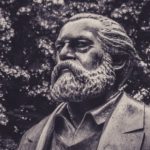Carl Trueman’s 2020 book, The Rise and Triumph of the Modern Self, is a remarkably thorough, charitable, and readable intellectual genealogy of the strange philosophy of the sexual revolution, which Trueman and others call “expressive individualism.” This theory, which is heavily influenced by Marxism, teaches “that all . . . moral judgments are nothing but expressions of preference, . . . attitude, or feeling.”
Because he is a Christian who acknowledges human freedom, Trueman does not explain the sexual revolution and similar social transformations as the consequence of ideas alone (a common fault of conservatives). His goal, rather, is to show how expressive individualism “helps explain why society thinks and behaves the way it does” (emphasis added). Nevertheless, Trueman, who wishes to defend the Western tradition—especially its natural law ethics—slips into the same deterministic, Marxist anthropology he critiques. The reason is that he relies on Alasdair MacIntyre’s and Charles Taylor’s philosophical views, which borrow, as Trueman admits, from the philosophy of Marx himself and his teacher, G. W. F. Hegel.
Trueman’s book provides an occasion to explore and correct a key mistake that he, MacIntyre, Taylor, and other contemporary Christians commit. They think they can use Marx’s and Hegel’s view that society radically frames individual judgment in order to fight the false, selfish individualism of our times. But this strategy ends up rejecting defining aspects of Western ethics: that the person transcends his society as a free being, that he knows God and truth directly, and that he is responsible for his actions. The better solution to contemporary selfishness, I suggest, is not to downplay our individuality, but to affirm it authentically.
“We Are All Expressive Individualists Now”
Start your day with Public Discourse
Sign up and get our daily essays sent straight to your inbox.MacIntyre, a professing Catholic, remains strongly attached to the Marxism of his pre-Christian days. He says human actions are “socially embedded” and “constituted” by society, a point with which, Trueman thinks, “Karl Marx would have agreed.” Trueman finds clear “continuity between [MacIntyre’s] Marxist phase and his later Aristotelian-Thomist arguments” about the dependence of the person on society.
Taylor, also a Catholic, uses Hegel’s notion of Sittlichkeit or “morality,” understood as the product of the customs of a historical community, rather than of transcendent, universal principles. In this understanding of ethics, Trueman explains, the “[e]xternal environment” of society “creates” desires in us that “can be . . . very real.” Our circumstances “frame” our being fundamentally: “[W]ho we are is a dialogue between our self-consciousness and the world around us.”
Trueman therefore suggests that an individual cannot see reality other than as his social setting tells him. This leads him to conclude of our own times that:
When it comes to how we think of ourselves, we are all expressive individualists now, and there is no way we can escape from this fact. It is the essence of the world in which we have to live and of which we are a part.
Is the idea that society “creates” human desires really compatible with the Western ethical tradition? To answer that question, we might consider the view of Jacques Maritain, another Christian who tried to find common cause with Hegelianism—specifically Marxism—against selfish individualism.
The problem with Marxism, Maritain said, was only that it left God out. It saw humans as only material individuals, not also spiritual persons made in God’s image, and therefore subsumed persons into a totalitarian society.
Christian Marxism?
Like Trueman and MacIntyre, Maritain thought that Marx’s view, that human society determined the individual fundamentally, was Christian in spirit, in harmony with the Bible’s vision of the Kingdom of God and the philosophy of the medieval Christian Thomas Aquinas.
Maritain agreed with Marx (and Hegel) that individuality is essentially separation from society. He conceived it as the direct effect of man’s material or bodily nature; of itself, it tends to “dispersion” and selfishness, in opposition to the common good. What saves man from this tendency is the spiritual or “personal” soul, which informs his body and communicates with God, and thereby with God’s creation. Thus man is one being, body and soul, but his nature is divided between “two poles,” personality and individuality, the former being the proper ruler of the latter.
The problem with Marxism, Maritain said, was only that it left God out. It saw humans as only material individuals, not also spiritual persons made in God’s image, and therefore subsumed persons into a totalitarian society. Trueman effectively makes the same critique of expressive individualism: it rightly appreciates the worth of the individual, but goes awry for not “grounding [that worth] in a sacred order.”
But as Augusto Del Noce argues persuasively in The Problem of Atheism, this view that Maritain (like MacIntyre and Trueman) represents deeply misunderstands both Marxism and individuality. Atheistic totalitarianism is not tacked on by chance to Marx’s understanding of the individual’s relation to society; it goes hand in hand with it. Marx understood correctly what Maritain did not: that the notion of individuality presumes the existence in material beings, like humans, of non-material principles that could distinguish one being from another. If individuals’ mutual distinction is, of itself, opposed to a species’ unity, as what alienates “species-beings” from one another, so is the non-material principle that could justify that distinction. A principle like the human soul, which could exist independently of the body, would be even more alienating. And most divisive would be a purely spiritual God to whom the individual could appeal against the demands of society.
Individuality Is Wholeness, Not Separation
Ironically, by some accounts, Marx’s belief that human individuality and spirituality are intrinsically related is in fact Aquinas’s position, contrary to what Maritain suggests. But whereas Marx despises individuality, Aquinas affirms it; and in doing so he provides a much better metaphysical framework for refuting expressive individualism than what Trueman proposes.
As Etienne Gilson explains, Aquinas agrees that the body’s matter is indeed necessary to human individuality. But man’s matter only makes his individuality possible, together with the soul, the other co-principle of human nature, that informs the body. The possibility of nature alone does not make a thing exist actually; for that, a distinct act of being, or existence, must actualize nature’s possible acts. That act primarily causes the individual, vivifying the soul and the body through the soul, thus making the whole man.
Moreover, this “to be” of man’s is the act most like God’s own spiritual nature in our experience, by which man depends directly on God always. And because man’s soul (unlike an animal’s) retains its act of being permanently (even if separated from the body in death), man is himself unequivocally spiritual, a free, intelligent “I am” in God’s image.
Spirituality, or personhood, is therefore not the contrary of individuality but its consummation. The more perfect (or virtuous) one’s individual being, the more spiritually perfect one will be—united to God and to others in him—and vice versa. Hence no individuals are more different from each other than the virtuous are, while the selfish and depraved blend into the same, dull mass.
This is how Aquinas can recognize, unlike both Marx and Maritain, that individuality is not essentially separation from society. Individuality is wholeness, indivisibility, and unity, which God exemplifies perfectly. Society’s wholeness is only a lesser image of the individual’s because only individuals exist in themselves. Non-individuals, like societies, do exist, but only in and through individuals—as when individuals form societies by relating to one another, especially to God in whom all things have their being.
Society, through the created individuals that form it, provides only conditions for each man’s existence. His parents supply his body, without which he could not come to be. But only the Creator, who is “He Who Is,” can make man’s spiritual soul that is in itself and makes the man exist. Ordinarily, a man also needs family and friends to help his pursuit of virtue; but if their help is lacking, God’s help is always available. An individual’s existence relates to others’ in an indirect and “contingent” way; but it relates to God, even at the natural level (not to mention the supernatural one), in a direct and “necessary” way.
Freedom and Conscience
The problem with expressive individualism—the sexual revolution, identity politics, and the like—is that it isn’t really individualism but collectivism in disguise. It capitalizes on people’s genuine desire for wholeness; and instead of directing them toward spiritual perfection, it encourages them to follow their feelings, which dissipates their personalities. The solution to it is not to deemphasize individuality but to help people cultivate their individuality authentically by choosing better, often by going against their feelings and what others say.
But the anti-individualist, Marxist-Hegelian ethics that Trueman recommends will only discourage people from that difficult task. We only choose what we judge to be good. But if, as MacIntyre says, such judgment “can exist only within a tradition,” according to how society “constructs social relations,” our moral judgment is the direct product of society. How then could we begin to be virtuous unless we changed society top-down, by revolution?
If, however, the whole person has existence in his own right, rooted in his nature, then he need not overturn the social order to begin his moral conversion. He will always be free to choose independently of the laws of society’s mores or Sittlichkeit, because the laws of his nature are the true “frame” of his life. He “can’t not know” them because they are engraved in his conscience. Severe temptations from without may decrease man’s guilt if he goes against nature. But as long as he lives, the inner voice of conscience will always urge him toward good and away from evil, regardless of what his surroundings or feelings tell him. He is always responsible for his actions.
If history and culture determine our choice of the good, all the more will they determine our choice for God, the most transcendent good of all.
Freedom and Religion
The task of moral conversion requires religious conversion. The moral law is God’s law, and the spiritual existence by which we transcend bad influences depends on God’s existence.
But Trueman’s ethical approach undermines this task as well. If history and culture determine our choice of the good, all the more will they determine our choice for God, the most transcendent good of all. This gives little hope to us since, as Charles Taylor says in A Secular Age (published in 2000), “belief in God isn’t quite the same thing in 1500 and 2000.” In secular times such as ours, it seems much harder to choose God than in the religious Middle Ages, when, as Trueman explains,
[B]elief in God was the cultural default position, and being a member of the Catholic Church was the only option. In fact, it was not really an option at all: you were baptized a Catholic at birth, and there was no other church to which you could belong. It would have been impossible even to conceive of religious choice in today’s sense.
But if each individual stands in a necessary existential relation to God, then every person always can and does face the choice of how to relate to God, whether the environment be hostile or favorable to one religion or any religion.
This is what Joseph Ratzinger argued in Introduction to Christianity, pointing to history that complicates Trueman’s and Taylor’s accounts of religious choice. Despite the overwhelmingly Catholic character of medieval culture, a “great mass” of medieval Europeans were “nominal believers,” for whom Catholicism “was only a ready-made mode of life.” They never “really entered into the inner movement of belief,” because though they might have followed exteriorly the forms of public religion, they were free to go their own way privately. How else could Martin Luther or Ulrich Zwingli have found the initiative to start the Protestant Reformation? How else could large numbers of Europeans spontaneously have adopted Protestantism over Catholicism? If culture is so decisive for religion, how does one explain the deathbed temptations to atheism of someone as deeply formed by Catholic culture as the “naïve” Thérèse Martin of Lisieux, France? On the other hand, how does one explain how ancient Christians, a minority in the pagan Roman Empire, defied their government’s religion on pain of death?
Every religious believer, even one who remains in the same religion his whole life, will still experience, if he takes his religion seriously, the need to recommit himself to God daily by choosing again and again to follow God’s will rather than his own. That sort of choice is the essence of religion, and it is always available to us, even when social structures reward certain religious options over others.
Don’t Sweat the Sittlichkeit
We are not all expressive individualists now, nor is expressive individualism essential to our world. What is essential is human nature—which is the same in every age—and how we choose to act on it, taking in hand our life that finally belongs to God and ourselves, not to any human society.
Society’s Sittlichkeit conditions how we live out the possibilities of our lives, and bad influences may reduce our culpability if we live poorly. But we all remain fundamentally free to choose independently of what society tells us, especially if we seek God’s help. To say with Trueman that “there is no way we can escape” our social conditions goes too far.
Each of us can live in the truth now, by the often hidden choices we make each day, to do what is good even if it is uncomfortable or unpopular. Then we will find strength to rise above temptation and help our friends do the same. And in time, that cultivation of our own person, through our love of God and of others in and for him, will change the world.
Image by sunaiart and licensed via Adobe Stock. Image resized.














